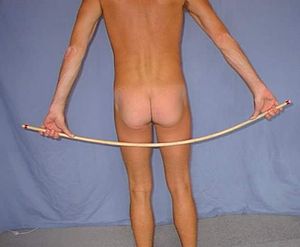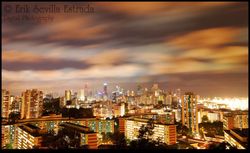Singapore: Difference between revisions
(Created page with "{{Header}} {{WorldMap|SG}} thumb|250px|Singapore by night. {{header}} '''Singapore''' (Singapura, officially the Republic of Singapore), i...") |
No edit summary |
||
| Line 53: | Line 53: | ||
{{wr|Caning_in_Singapore}} | {{wr|Caning_in_Singapore}} | ||
{{Countries}}{{Footer | {{Countries}}{{Footer}} | ||
Revision as of 21:12, 7 November 2020
Singapore (Singapura, officially the Republic of Singapore), is an island city-state in Southeast Asia, located at the southern tip of the Malay Peninsula. Its population is about 4.6 million, most of which live in Singapore City.
The majority of the population are ethnic Chinese. Minorities include Malays, Indians, Indonesians and non-Asians. The nation's official languages are English, Mandarin, Malay and Tamil.
Spanking in Singapore
Spanking of children for discipline is common in Singapore. The traditional and most common spanking implement for children is the thin and whippy rattan cane. It is sold for this purpose in grocery stores. Today, about 20% of parents were found to use this form of discipline in a survey (source: Straits Times, 17 September 2004).
Singaporean schools are known for their strict, almost military, military drills and high standards of discipline. School uniforms are mandatory. School corporal punishment exists (in the form of caning), but only for male students, applied to the boy's clothed buttocks.
Judicial caning in Singapore

Like its neighbour country Malaysia, Singapore law includes judicial corporal punishment for various crimes. It is given as a number of full-force strokes with a long rattan cane to the bared buttocks of the delinquent, who is restrained in a caning trestle in a bending-over position. The rattan cane is 1.2 metres long and up to 1.27 cm thick (Prison Regulations 132(2)), i.e. considerably thicker and heavier than a school cane. Parts of the prisoner's body are padded to prevent accidental damaging of the kidneys and the genitals. Such a judicial caning usually draws blood and can, in the case of a large number of strokes, leave permanent scars. Only male criminals under 50 are subject to judicial caning; female criminals are not caned.
Thousands of male criminals are caned in Singapore each year for both violent and non-violent offences such as vandalism, overstaying one's visa or illegal immigration. Caning is never ordered on its own, but always as an addition to a prison sentence.
The punishment is carried out privately in a prison, in the presence of a prison officer and a medical officer. Contrary to widespread belief, it is never administered in public, and never has been. The caning is carried out in a single session, and not by 'instalments'. Thus, a person sentenced to 24 strokes of the cane (the maximum possible sentence) will have the entire sentence carried out at once. The persons carrying out the caning are specially trained prison officers.
A smaller cane is used for juvenile offenders (boys under 16), who may be sentenced to caning only by the High Court and not by the local courts. There are a few dozen of these canings of boys per year.
The Michael Fay caning incident
Michael Fay (b. 1975) is an American who briefly shot to worldwide fame when he was sentenced to caning in Singapore as an 18-year-old in 1994 for theft and vandalism. Caning is a routine court sentence in Singapore but most Americans were unfamiliar with it, and Fay's case was the first caning involving an American citizen.
The sentence created an international incident that stirred up a great deal of public outrage and ignited a fierce debate in the media over the issue of judicial caning as well as the controversy surrounding the use of corporal punishment in general. U.S. President Bill Clinton asked the Singapore government to waive the caning, which he called "excessive." After losing an appeal against his sentence, Fay asked Singapore's President Ong Teng Cheong for clemency.
On May 4, 1994 the government announced that Fay's caning had been reduced from six to four strokes as a gesture of respect for the American president.
Shades of Singapore book
Within months of the Michael Fay affair, a paperback book was published entitled Shades of Singapore: Sister Sarah Balfour's Memoirs of Judicial Caning in South Africa, Vol. I, by Angus Balfour (New York: Blue Moon Books, 1994). This 294-page novel of punishment erotica purports to be the memoirs of a retired Nursing Sister who took part in dozens of court-appointed canings of women in pre-war South Africa.
The original title, Judicial Female Corporal Punishment Memoirs, appears on the contents page. It is indicative of the widespread notoriety of the Fay controversy that a book set in South Africa in the 1930s would have its title hastily altered to capitalize on a contemporary incident in Singapore.
Singaporean spanking artists
None known so far.
See also
Links
- Criminal Procedure Code
- Corpun: Judicial Caning in Singapore, Malaysia and Brunei on World Corporal Punishment Research
- More information is available at [ Wikipedia:Caning_in_Singapore ]

- More information is available at [ Wikipedia:Caning_in_Singapore ]
Chat rooms • What links here • Copyright info • Contact information • Category:Root
